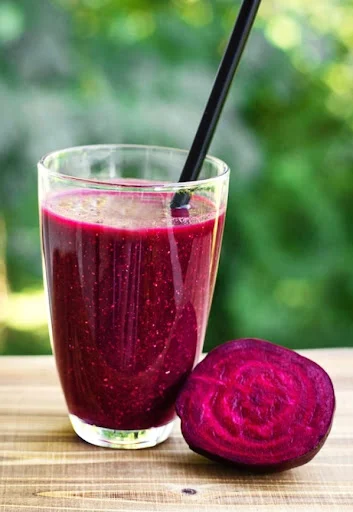- 2 medium-sized beets, peeled and chopped
- 1 large carrot, peeled and chopped
- 1 large apple, cored and chopped
- 1 inch piece of ginger, peeled
- 1 lemon, juiced
- 2 cups of water
Instructions:
1. Add the chopped beets, carrot, apple, and ginger to a juicer.
2. Juice the ingredients.
3. Pour the juice into a glass.
4. Add the lemon juice and stir.
5. Drink the juice immediately to get the full nutritional benefits.
The recommended amount of beet juice to drink per day to experience health benefits varies depending on the individual and their health goals. As a general guideline, drinking 8-16 ounces (240-480 ml) of beet juice per day is a good place to start. It's important to note that beet juice can interact with certain medications, so it's best to consult with a healthcare provider before adding it to your daily routine.
Can I add any other ingredients to the juice for extra nutrition?
Yes, you can add other ingredients to the juice for extra nutrition. Here are some options:
- Spinach or kale: These leafy greens are rich in iron and other vitamins and minerals.
- Celery: This low-calorie vegetable is a good source of potassium and other nutrients.
- Cucumber: This hydrating vegetable is a good source of vitamin K and other nutrients.
- Lemon or lime: These citrus fruits are high in vitamin C and can help improve digestion.
- Turmeric: This spice has anti-inflammatory properties and can help boost the immune system.
Just be mindful of the flavors and how they may interact with each other. You may need to adjust the amounts of each ingredient accordingly.
What are some of the specific health benefits that come with drinking beet juice regularly?
Drinking beet juice regularly can have several health benefits, including:
1. Lowering blood pressure: Beet juice contains nitrates that can help relax and widen blood vessels, leading to lower blood pressure.
2. Boosting exercise performance: The nitrates in beet juice can also increase blood flow to muscles, reducing fatigue and improving athletic performance.
3. Improving digestion: Beet juice is high in fiber, which can promote digestive health and help regulate bowel movements.
4. Reducing inflammation: Beets contain betaine, a compound that has been shown to have anti-inflammatory properties and may help reduce the risk of chronic diseases.
5. Supporting liver health: Beets contain antioxidants and other compounds that can help support liver function and detoxification.
6. Enhancing brain function: The nitrates in beet juice can also improve blood flow to the brain, potentially enhancing cognitive function and reducing the risk of dementia.
Can drinking beet juice cause kidney damage even in healthy individuals?
Drinking beet juice in moderation is generally considered safe for healthy individuals and is even beneficial for some health conditions. However, excessive consumption of beet juice can potentially cause kidney damage, especially in individuals with pre-existing kidney problems or those who are at high risk for kidney disease. This is because beets contain high levels of oxalates, which can accumulate in the kidneys and form crystals, leading to kidney stones or other kidney problems. Therefore, it's important to consume beet juice in moderation and consult with a healthcare provider if you have any concerns about your kidney health.
What other health conditions should I be aware of before consuming beet juice?
While beet juice is generally considered safe and has many health benefits, there are a few health conditions that you should be aware of before consuming it.
Firstly, if you have low blood pressure, you should be cautious when consuming beet juice, as it can lower blood pressure even further.
Secondly, if you have diabetes, you should monitor your blood sugar levels closely when consuming beet juice, as it contains natural sugars that can affect blood sugar levels.
Lastly, if you have digestive issues such as Irritable Bowel Syndrome (IBS), you may want to limit your intake of beet juice, as it can be high in fiber and may cause gastrointestinal discomfort in some people.
As always, it's best to consult with your healthcare provider before making any significant changes to your diet.
Can beet juice have any positive effects on blood sugar levels for people with diabetes?
There is some evidence to suggest that beet juice may have positive effects on blood sugar levels for people with diabetes. Beets contain a high concentration of nitrates, which may help improve insulin sensitivity and glucose uptake in the body. Additionally, beet juice contains antioxidants and anti-inflammatory compounds that may help reduce oxidative stress and inflammation, which are both associated with diabetes complications. However, more research is needed to fully understand the potential benefits of beet juice for people with diabetes, and it's important to monitor blood sugar levels closely when consuming it. It's always best to consult with a healthcare provider before making significant changes to your diet or treatment plan.
Are there any potential side effects or risks associated with consuming beet juice for people with diabetes?
While beet juice may have potential benefits for people with diabetes, there are also some potential risks and side effects to be aware of.
Firstly, beet juice is high in natural sugars, which can cause a sudden spike in blood sugar levels if consumed in large amounts. This can be especially problematic for people with diabetes who are already struggling to manage their blood sugar levels.
Additionally, beet juice can interact with certain medications, such as blood pressure medications, and may cause adverse effects. It may also cause gastrointestinal discomfort, such as bloating and diarrhea, in some people.
It's important to consult with a healthcare provider before adding beet juice to your diet, especially if you have diabetes or are taking any medications. They can help you determine whether beet juice is safe for you to consume and how much you should consume to avoid any negative effects.



